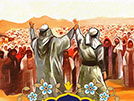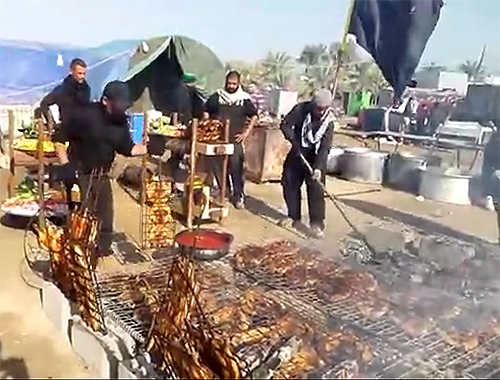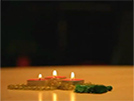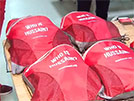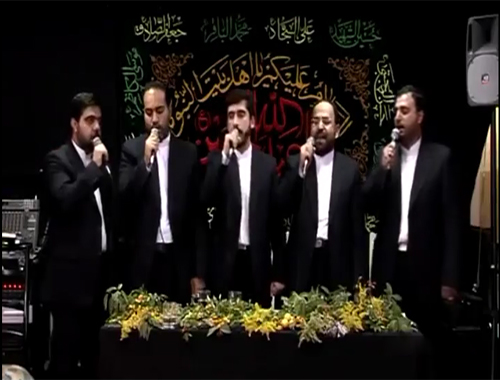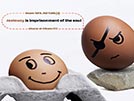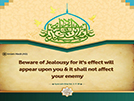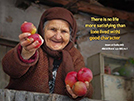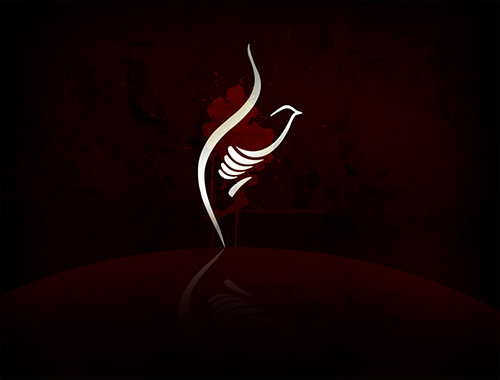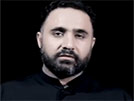HOW TO USE THE MEAT OF A SACRIFICED ANIMAL ACCORDING TO THE HOLY QURAN AND TRADITIONS
- Details
- Hits: 2460
HOW TO USE THE MEAT OF A SACRIFICED ANIMAL ACCORDING TO
THE HOLY QURAN AND TRADITIONS
وَالْبÙدْنَ جَعَلْنَاهَا Ù„ÙŽÙƒÙمْ Ù…Ùنْ شَعَائÙر٠اللهÙØŒ Ù„ÙŽÙƒÙمْ ÙÙيهَا خَيْرٌ، ÙَاذْكÙرÙوا اسْمَ الله٠عَلَيْهَا صَوَاÙÙ‘ÙŽØŒ ÙÙŽØ¥Ùذَا وَجَبَتْ جÙÙ†ÙوبÙهَا ÙÙŽÙƒÙÙ„Ùوا Ù…Ùنْهَا وَأَطْعÙÙ…Ùوا الْقَانÙعَ وَالْمÙعْتَرَّ، ÙƒÙŽØ°ÙŽÙ„ÙÙƒÙŽ سَخَّرْنَاهَا Ù„ÙŽÙƒÙمْ لَعَلَّكÙمْ تَشْكÙرÙونÙ.
?And (as for) the camels, We have made them of the signs of the religion of Allah for you; for you therein is much good; therefore mention the name of Allah on them as they stand in a row, then when they fall down eat of them and feed the poor man who is contented and the beggar; thus have We made them subservient to you, that you may be grateful. (The Holy Quran; 22:36)? ÙÙŽÙƒÙÙ„Ùوا Ù…Ùنْهَا وَأَطْعÙÙ…Ùوا الْبَائÙسَ الْÙÙŽÙ‚Ùيرَ
?Then eat of them and feed the distressed one, the needy. (The Holy Quran; 22:28)?
Abu-Sabbah Kanani says: I asked the opinion of Imam Sadiq (a.s) about the meat of sacrifice animal, he (a.s) said: كانَ عَلÙيّ٠بنَ الØÙسين٠وأبو جَعÙَر٠عليهÙما السلام٠يَتَصَدَّقان٠بÙØ«ÙÙ„Ùث٠عَلى جيرانÙÙ‡ÙÙ… وثÙÙ„Ùث٠على السّÙؤّال٠وثÙÙ„ÙØ«Ù ÙŠÙمسÙكونَه٠لأهل٠البيتÙ.
--------------------------------------------------------------------------------
( 133 )
?Imam Sajjad and Imam Baqir (a.s) used to give a third of it to neighbors, another third to beggars, and the remaining third was for the family members.?
It is therefore incumbent upon the heads of the Islamic nations to create well-equipped organizations for distributing the meat of sacrificed animals among the needy on an international level, by getting permission from the religious authorities in order to realize both the Quranic ruling and to display to the world people an example of the sublime Islamic teachings.
Mohammad ibn Muslim says: I asked Imam Sadiq (a.s) whether it is permissible to take the meat of the sacrificed animals out of Mina. He (a.s) answered: ÙƒÙنّا نقول٠لا يخرÙج٠مÙنها شيءٌ Ù„ÙØاجَة٠الناس٠إليهÙØŒ Ùأمّا اليومَ Ùَقَد ÙƒÙŽØ«Ùرَ الناس٠Ùَلا بأسَ بÙإخراجÙÙ‡Ù
?Formerly, people of Mecca were in need for them, but today because of too many pilgrims and sacrifices, their being taken out of Mina is no problem.?1
Under the present circumstances and due to lack of well-equipped organizations, part of the sacrificed animals is unfortunately buried. Nevertheless, this loss has to be tolerated, for the sublime goal of presenting the socio-political aspect of Hajj will be ensured. That is to say, the financial aspect of the event has to be sacrificed for its socio-political aspect.
HALQ AND TAQSIR IN MINA AND THE PHILOSOPHY
Following the completion of sacrifice, a pilgrim's duty is Halq and Taqsir. Halq means to shave one's head, and Taqsir is to shorten the nail or hair. Women must clip their nails and cut some locks of their hair while men have the choice to shave their heads or shorten. According to certain religious decrees, Halq is obligatory for men. The Quranic Verse on this religious duty is, ?Then let them accomplish their needful acts of shaving and cleansing. (22:29)?
Imam Reza says: التَّÙَث٠تَقليم٠الأظاÙÙر٠وطَرØ٠الوسَخ٠وطَرØ٠الإØرام٠عنه
____________
1 See al-Kafi; vol. 4 p. 500 hadith 7
--------------------------------------------------------------------------------
( 134 )
?The Arabic word 'tafath ?mentioned in the Holy Quran-' means to clip the nails, to remove dirt, and to come out of the state of Ihram.?1
Evidently, this is the surface meaning, but the in-depth meaning is purification of soul from filth of vices.
Imam Sadiq (a.s) says: واØÙ„Ùق٠العÙيوبَ الظّاهÙرةَ والباطÙنةَ بØَلق٠شَعرÙÙƒÙŽ
?By shaving your head, remove all inward and outward flaws.?2
Imam Sajjad (a.s) posed the following questions to a man who had returned from Mecca: ÙَعÙندَما Øَلقْتَ رَأسَكَ، نَوَيتَ أنكَ تَطَهّرتَ Ù…ÙÙ† الأدناس٠ومÙÙ† تَبÙعَة٠بني آدمَ وخَرَجتَ Ù…ÙÙ† الذّنوب٠كما وَلدتكَ Ø£ÙمّÙÙƒÙŽ
?Did you have the intention to cleanse yourself from all pollutions and violations of rights of people and do without wrongdoings as if you were born of your mother when shaving your head in Mina??3
According to other hadiths, the word 'tafath' means to meet the Imam.
Thareeh asked Imam Sadiq (a.s) about the meaning of the above-mentioned Quranic Verse to which the Imam said: التّÙÙŽØ«Ù Ù„Ùقاء٠الإمامÙ
?'tafath' means to meet the Imam.?4
By meeting Imam Mahdi (a.s), darkness of ignorance turns into light of knowledge, virtues replace vices, and an inner purification comes about. About such people the Holy Quran says: اَلَّذÙينَ آمَنÙوا وَعَمÙÙ„Ùوا الْصَّاÙÙ„Øَات٠طÙوبَى Ù„ÙŽÙ‡Ùمْ ÙˆÙŽØÙسْن٠مَآبÙ
?(As for) those who believe and do good, a good final state shall be theirs and a goodly return. (The Holy Quran; 13:29)?
____________
1 See al-Wafi; vol. 2 Kitab al-Hajj
2 See Misbah ush-Shari'a; chapter 21.
3 See Mustadrak ul-Wasaail; vol. 2
4 See al-Wafi; vol. 2 Ziyarat
--------------------------------------------------------------------------------
( 135 )
مَنْ عَمÙÙ„ÙŽ صَالÙØاً Ù…Ùنْ ذَكَر٠أَو Ø£Ùنْثَى ÙˆÙŽÙ‡ÙÙˆÙŽ Ù…ÙؤْمÙÙ†ÙŒ ÙÙŽÙ„ÙŽÙ†ÙØْيÙيَنَّه٠Øَيَاةً طّيَÙبَةً
?Whoever does good whether male or female and he is a believer, We will most certainly make him live a happy life. (The Holy Quran; 16:97)?
Hence, the Imam (a.s) drew people's attention to their duties by saying: اÙبدَؤوا بمَكَّةَ واخْتÙموا بÙنا
?Begin your Hajj from Mecca and complete it with our visitation.?1
By visitation, it is meant to renew one's pledge with the Imam and to follow him. Failing to feel the presence of the Imam, they will look like a flock without shepherd, dispersed and exposed to wolves' attack. Hence, the only benefit to Halq and Taqsir in Mina is a physical purification and nothing more. Even their Eid will lost its true meaning and the sorrows of men of understanding will increase. In this relation, Abdullah ibn Dinar quotes Imam Baqir (a.s) as saying: ما Ù…Ùنْ عيد٠للمÙسلمÙينَ أضØÙ‰ ولا ÙÙطْر٠إلاّ وهÙÙˆ يَتَجدّد٠Ùيه٠لآل٠مØَمَّد٠صلّى الله عليه٠وآله٠ØÙزنٌ... لأÙنّهم يَرَونَ Øَقَّهم ÙÙŠ يد٠غيرÙÙ‡ÙÙ….
?There is no single Eid ul-Fitr or Eid ul-Adha in which Muslims do not renew their sorrows for the household of the Holy Prophet ?the Ahl ul-Bayt (a.s)? because they see their rights in the hands of others.?2
On the Eid days when Muslims congregate, the Imam (a.s) as an 'axis' round whom all should turn must be present. The worshippers must perform prayer under his leadership, sermons have to be delivered, and the boundaries of the religion have to be defended by him. Nevertheless, regrettably, they miss the Imam in all these positions. To whatever direction they go, they do not see any sign of their guardian. When they go for Ramy al-Jamarat, they do not have a commander; when they go to the place of sacrifice, they have no leader; when they perform Halq and Taqsir, there is no sign of the true Reformer and Purifier. The Imam, too, is sad about the disorderly situation of his followers. The Shiite Muslims who miss their master start lamenting. It is for this reason that one of the recommended
____________
1 See al-Wafi; vol. 2 Ziyarat
2 See Ilal ush-Shara'ie; vol. 2
--------------------------------------------------------------------------------
( 136 )
duties or Shiite Muslims on Eid ul-Fitr, Eid ul-Adha, Eid ul-Ghadir, and Fridays is to read Duaa an-Nudba. 'Nudba' means lamenting in separation from an endeared one, relating a beloved's description, and shedding tears for his absence. Hence, as long as the Shiites are separate from their Imam, they keep on lamenting especially on the said occasions when their sorrows are renewed. A part of Duaa un-Nudba says: Ùَعَلى الأطائÙب٠مÙÙ† أهل٠بيت٠مØمَّدÙوعَلÙيّ٠(صَلى الله٠عَليهÙما وآلهÙما) Ùَليَبْك٠الباكونَ، وإيّاهÙÙ… ÙَلينْدÙب٠النّادÙبونَ، ولÙÙ…ÙثلÙÙ‡ÙÙ… ÙَلتÙذرَÙ٠الدّموع٠ولْيصْرَخ٠الصّارÙخونَ ويضÙجَّ الضّاجّÙونَ ويعÙجَّ العاجّونَ. أينَ الØسن٠أينَ الØÙسينÙØŒ أين أبناء٠الØÙسين٠صالØÙŒ بعدَ صالØ٠وصادÙÙ‚ÙŒ بعدَ صادÙÙ‚Ù. أينَ السبيل٠بعدَ السبيل،٠أين الخÙيَرَة٠بعدَ الخÙيَرَةÙØŒ أين الشّموس٠الطّالÙعَةÙØŒ أين الأقمار٠المÙنيرةÙØŒ أين الأنجÙم٠الزّاهÙرةÙØŒ أين أعلام٠الدّين٠وقَواعÙد٠العلمÙØŒ أين بقÙيّة Ùالله٠التي لا تخَلو Ù…ÙÙ† العترة الهادية.
For the purified ones of the progeny of Mohammad and Ali (may peace be upon both of them and their progeny); the bewailers should cry and the wailers should wail. And for their likes tears should be shed and clamorers should clamor and mourners should mourn in a heart-rending manner: where is Hasan? Where is Hussein? Where are the children of Hussein? the whole righteous and whole truthful? Where is the path after the path of righteousness? Where are the virtuous people after virtuous people? Where are the rising suns? Where are the luminous moons? Where are the emblems of faith and basis of knowledge? Where is Baqiyyatullah that the world cannot be devoid from the presence of guided progeny??
The Eid of Shiite Muslims will come a day when they see on their heads the shade of the Imam (a.s) who will hoist the banner of monotheism, will put the world on the path of God under the light of his guidance, and will fill the world with security. اَللّهÙÙ…ÙŽ أرÙني الطّلعَةَ الرّشيدَةَ والغÙرَّةَ الØَميدَةَ وأَكْØÙÙ„ ناظÙري بÙنظرَة٠مÙني إلَيه٠وعَجّÙلْ Ùَرَجَه٠وَسَهّÙلْ مَخْرَجَه٠وَأَوْسÙعْ مَنْهَجَه٠وَاسْلÙكْ بي Ù…ÙŽØَجَّتَه٠وأَنÙÙذْ أَمْرَه٠وَاشْدÙدْ أَزْرَهÙ
?O Allah, show me that illustrious countenance, and that illuminated forehead, enlighten my eyes with his visit, hasten his reappearance, facilitate his exit, widen his path,
--------------------------------------------------------------------------------
( 137 )
take me on his path, make his influence pervasive, and support him.?1

